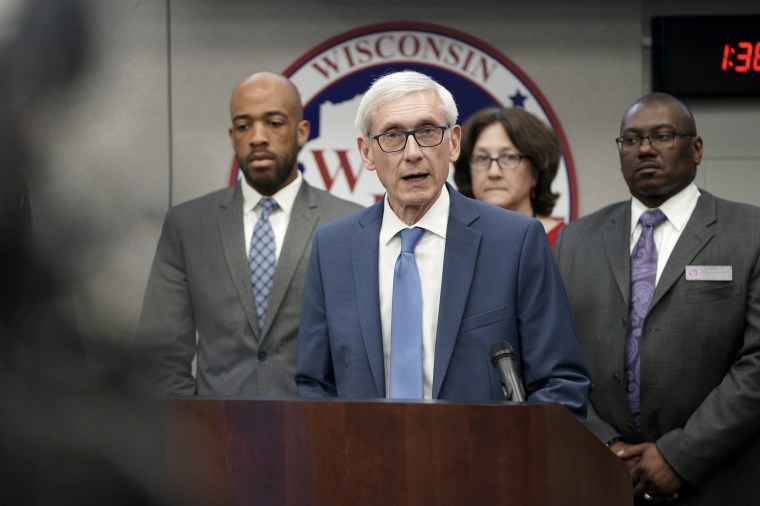Wisconsin Gov. Tony Evers on Monday signed an executive order suspending all in-person voting for Tuesday's primary and moved the date of the election to June 9 amid concerns about the coronavirus pandemic.
The order also convenes the state Legislature for a special session on Tuesday to deal with the issue.
“Today, I signed an executive order suspending in-person voting for tomorrow’s election,” Evers said in a statement. “Frankly, there’s no good answer to this problem — I wish it were easy.”
"I had hoped that the Legislature would do its part — just as the rest of us are — to help keep people healthy and safe," Evers added. "But as municipalities are consolidating polling locations, and absent legislative or court action, I cannot in good conscience stand by and do nothing. The bottom line is that I have an obligation to keep people safe, and that’s why I signed this executive order today.”
Evers' order suspends in-person voting for the April 7 primary and moves it to June 9. The order also states that if the Legislature does not enact legislation to change the new election date during its special session, in-person voting will occur on June 9.
The move comes days after a judge declined to postpone the primary, which Republicans have been fighting to hold Tuesday. The judge did, however, order the state to accept absentee ballots that arrive as late April 13 and he later said the state could not release results until that afternoon.
Evers' order said all ballots already cast for the election will remain valid and will be tallied in conjunction with the new in-person voting date.
State Republicans said moments after the order that they were "immediately challenging" it.
"The clerks of this state should stand ready to proceed with the election. The governor's executive order is clearly an unconstitutional overreach," Republican state Senate Majority Leader Scott Fitzgerald and GOP Assembly Speaker Robin Vos said in a joint statement.
"The governor himself has repeatedly acknowledge he can't move the election. Just last week a federal judge said he did not have the power to cancel the election and Governor Evers doesn't either," they added.
Fitzgerald and Vos later filed an emergency petition against Evers in the Wisconsin state Supreme Court to prevent Evers' executive order from going into effect.
The state's Elections Commission said Monday that it was still still advising municipal and county clerks to "continue to making preparations in earnest for tomorrow" because of the expected "very fast moving litigation."
Wisconsin election officials had already created elaborate procedures to try to balance public health and the right to vote and were preparing up to the very last moment for the election to proceed.
They spent Monday morning training some 2,700 National Guard troops who had been called up to serve as poll workers — in plain clothes, aside from masks and gloves — after 60 percent of municipalities in the state reported a shortage of workers due to the outbreak.
Wisconsin officials had faced heavy criticism for planning to go ahead with the Tuesday primary despite the coronavirus pandemic. Every other state that was supposed to hold a presidential primary contest in late March or April had postponed its election or switched to vote-by-mail, which left one of the most critical battleground states in the country alone in a deserted stretch of the electoral calendar.
The stakes are especially high in Wisconsin because the election is not just a presidential primary between former Vice President Joe Biden and Sen. Bernie Sanders, I-Vt., but also a general election for down-ballot offices, including a Wisconsin Supreme Court seat that could influence voting rules in a state crucial to President Donald Trump’s re-election in November.
In addition, the terms of most local officials on the ballot Tuesday, such the mayor of the state’s largest city, Milwaukee, expire on April 21, so delaying the election might technically leave those offices vacant, increasing pressure on officials to proceed with the current date.
But Evers, as well as Republican legislative leaders, had resisted calls to move the election, prompting lawsuits, strains on election infrastructure and outcry that voters will have to choose between their health and their right to vote.
Evers has said he's powerless to change the date of the election because it's set by state law and would require the Legislature to come back into session and act. On Friday, he called on state lawmakers to allow the state to send an absentee ballot to every voter, as other states have done in response to the pandemic, but Republicans and nonpartisan experts said it would be difficult, if not impossible, to print and mail enough ballots on short notice.
State officials have urged voters to cast absentee ballots by mail as poll worker shortages threaten in-person voting, but the increased demand for over 1 million ballots put strains on the election system. Highlighting the impact of the poll worker shortages across the state, Milwaukee officials on Friday announced that just five in-person voting locations would be available on election day, down from the city’s usual 180 voting sites.
A federal district court judge in Madison last week denied a request from Wisconsin Democrats, who urged him to postpone the vote in light of the coronavirus pandemic and a statewide stay-at-home order. Theysaid the stay-at-home order prompted by the coronavirus pandemic would make voters unwilling to wait in lines to register or pick up absentee ballots, or to go to the polls Tuesday.
But the judge gave voters extra time to get absentee ballots and ordered the state to accept any ballot returned by April 13, regardless of when it was postmarked. He also barred the state from announcing any election results before that date.
The 7th U.S. Circuit Court of Appeals left that part of the judge’s ruling intact, and Wisconsin Republicans then took the issue to the Supreme Court, which could rule on the issue as soon as Monday.


